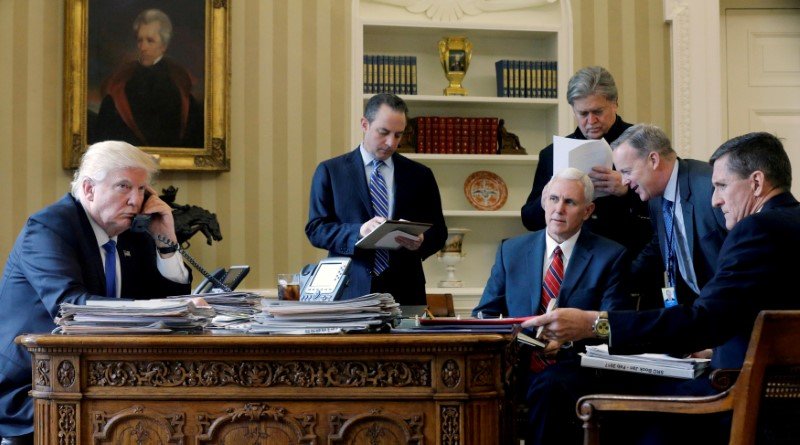Hackers believed to be Russian discussed how to steal Hillary Clinton’s emails from her private server and transfer them to Michael Flynn via an intermediary, The Wall Street Journal reported Thursday, citing reports compiled by US intelligence agencies investigating Russia’s interference in the 2016 election.
One of those intermediaries, according to The Journal, may have been a GOP operative named Peter Smith — an 80-year-old opposition researcher who assembled a team of technology experts, lawyers and a Russian-speaking investigator in September to track down hacking groups with access to the 33,000 emails Clinton deleted from her private server that she said were personal in nature.
While Smith cited a working relationship with Flynn’s consulting firm, Flynn Intel Group, when trying to recruit new team members, the Journal could not verify whether Flynn knew what Smith was doing, or if he knew him at all.
But one of the people Smith appears to have tried to recruit, Matt Tait, relayed his interactions with Smith in a first-person blog post for Lawfare published on Friday night — and noted that “it was immediately apparent that Smith was both well connected within the top echelons of the [Trump] campaign and he seemed to know both Lt. Gen. [Michael] Flynn and his son well.”
Tait, a cybersecurity researcher and former information security specialist at Britain’s Government Communications Headquarters, was an unnamed source for the Journal’s first article about Smith and a named source for the second.
The second, published on Friday, described how Smith listed top Trump advisers Kellyanne Conway, Steve Bannon, and Sam Clovis as part of a group he had formed to conduct opposition research on Clinton — research that involved asking hackers, Russian or not, whether they had her missing emails.
“A few weeks into my interactions with Smith, he sent me a document, ostensibly a cover page for a dossier of opposition research to be compiled by Smith’s group, and which purported to clear up who was involved,” Tait recalled for Lawfare.
He continued:
“The document was entitled ‘A Demonstrative Pedagogical Summary to be Developed and Released Prior to November 8, 2016,’ and dated September 7. It detailed a company Smith and his colleagues had set up as a vehicle to conduct the research: “KLS Research”, set up as a Delaware LLC “to avoid campaign reporting,” and listing four groups who were involved in one way or another. The first group, entitled “Trump Campaign (in coordination to the extent permitted as an independent expenditure)” listed a number of senior campaign officials: Steve Bannon, Kellyanne Conway, Sam Clovis, Lt. Gen. Flynn and Lisa Nelson.”
Tait said that he didn’t view this as “merely a name-dropping exercise.”
“This document was about establishing a company to conduct opposition research on behalf of the campaign, but operating at a distance so as to avoid campaign reporting,” Tait said. “Indeed, the document says as much in black and white…the combination of Smith’s deep knowledge of the inner workings of the campaign, this document naming him in the ‘Trump campaign’ group, and the multiple references to needing to avoid campaign reporting suggested to me that the group was formed with the blessing of the Trump campaign.”
Smith apparently contacted Tait after seeing his Twitter account, where Tait had spent a “great deal of time” analyzing the Clinton emails released by the State Department in response to Freedom of Information Act requests throughout 2015.
“Smith implied that he was a well-connected Republican political operative,” Tait recalled on Lawfare, and had contacted him because he believed “that Clinton’s private email server had been hacked—in his view almost certainly both by the Russian government and likely by multiple other hackers too.”
Smith mentioned that someone on the Dark Web had contacted him claiming to have Clinton’s emails, Tait wrote, and wanted Tait to help him verify if they were real.
Tait went along with it, he said, because he wanted to find out more about this “dark web” figure — was it a hoax, or was it a Russian intelligence front trying to use Smith as the “intermediary” the US intelligence community later described?
 Republican presidential candidate Donald Trump, right, talks with his campaign manager Kellyanne Conway during a visit to Goody’s Restaurant, Monday, Sept. 5, 2016, in Brook Park, Ohio. Associated Press/Evan Vucci
Republican presidential candidate Donald Trump, right, talks with his campaign manager Kellyanne Conway during a visit to Goody’s Restaurant, Monday, Sept. 5, 2016, in Brook Park, Ohio. Associated Press/Evan Vucci
Tait never found out, and, to this day, there is no evidence the hackers infiltrated Clinton’s server. But Tait soon realized that, to Smith, it didn’t matter if the hackers were Russian.
“In my conversations with Smith and his colleague, I tried to stress this point: if this dark web contact is a front for the Russian government, you really don’t want to play this game,” Tait wrote. “But they were not discouraged.”
Conway and Bannon told the Journal that they had never met Smith. Conway said she had heard of him in Republican circles but never interacted with him directly; Bannon said he’d “never heard of KLS Research or Peter Smith.”
Still, Tait’s story and the Journal’s reporting will likely be of interest to special counsel Robert Mueller, who is leading the FBI’s investigation into whether any of Trump’s associates colluded with Russia to undermine Clinton during the election.
Conway and Bannon are not under FBI investigation. But Flynn’s potential ties to Russia have been of particular interest to the bureau and the congressional intelligence committees because of his conversations with Russia’s ambassador to the US, Sergey Kislyak, that eventually led to his ouster.
Russian officials bragged about their close relationship to Flynn last year, according to intercepted communications described to CNN, and boasted that they could use him to influence Trump. The way the Russians were talking about Flynn “was a five-alarm fire from early on,” a former Obama administration official said.














